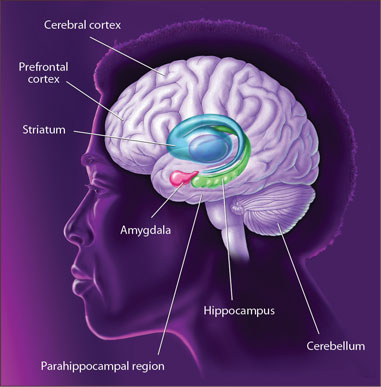When you find yourself in a dark place, you’re likely aware that you’re suffering emotionally but what happens to your body? Unhappiness is not confined to your brain. It cascades throughout your body through a well-known process known as the stress response. In her book Mind over Medicine Dr. Lissa Rankin reports, “When something hurts emotionally, an alarm is sounded. The stress response is triggered, even though there is no immediate bodily threat— just anger, disappointment, frustration, pessimism, heartbreak, grief, and other upsetting emotions”. The response to this stress is the release of a stress hormone called cortisol.
 In short bursts, cortisol is essential for steadying your body for a life saving event. Imagine being chased by a bear through the woods. The energy normally used for digestion and healing is directed by cortisol to the muscles so that your can either run like hell or face the beast and fight it out. The heart and lungs work faster to bring blood and oxygen to the brain and muscles. It increases all of your senses (smell, taste, sight and sound, etc.) so that you’re super sensitive to what’s going on around you to increase your chances of survival. This is called the fight or flight reaction. The only problem is that the brain doesn’t know the difference whether a bear is chasing you; your boyfriend cheated on you or your boss is riding you. Cortisol is being chronically released.
In short bursts, cortisol is essential for steadying your body for a life saving event. Imagine being chased by a bear through the woods. The energy normally used for digestion and healing is directed by cortisol to the muscles so that your can either run like hell or face the beast and fight it out. The heart and lungs work faster to bring blood and oxygen to the brain and muscles. It increases all of your senses (smell, taste, sight and sound, etc.) so that you’re super sensitive to what’s going on around you to increase your chances of survival. This is called the fight or flight reaction. The only problem is that the brain doesn’t know the difference whether a bear is chasing you; your boyfriend cheated on you or your boss is riding you. Cortisol is being chronically released.
Negative emotions that result in the release of cortisol promote the production of chemicals (cytokines) that promote inflammation, which has been linked to certain cancers, Alzheimer’s disease, arthritis, osteoporosis, and cardiovascular disease. Furthermore, negative feelings can contribute to delayed wound healing and infection, as cortisol weakness your immune system. When negative moods like pessimism, helplessness, hopelessness, anxiety, and depression prevail, the stress response turns on and stays on, leading to gastrointestinal disorders, greater vulnerability to infections and cancer, heart disease, hormonal disorders, and more. Yuck!
 Almost every major illness that people acquire has been linked to chronic stress. Between 75-90% of doctor visits have stress as a major contributing factor. I can personally attest to this as I enter my 28th year of clinical practice dedicated to treating human sickness and suffering. Most of the conditions that I see are as a result of the patient’s stressful lifestyle and they are usually the last one to recognize it. The biggest problem with chronic stress is that it adversely affects the brain and your overall sense of peace and fulfillment.
Almost every major illness that people acquire has been linked to chronic stress. Between 75-90% of doctor visits have stress as a major contributing factor. I can personally attest to this as I enter my 28th year of clinical practice dedicated to treating human sickness and suffering. Most of the conditions that I see are as a result of the patient’s stressful lifestyle and they are usually the last one to recognize it. The biggest problem with chronic stress is that it adversely affects the brain and your overall sense of peace and fulfillment.
If you happened to have read my blog, The enemy within, I spoke of the conscious and unconscious mind. Allow me to name the conscious mind as the prefrontal cortex (PFC) and the unconscious mind as the amygdala. The PFC connects to multiple areas of your brain receiving data which allows you to think and react to your world in a such a way to minimize suffering and maximize joy and happiness. It’s within the left prefrontal cortex where happiness is created.
 On the other hand, the amygdala is the boss when it comes to processing and storing memories of various emotions. In fact, the amygdala experiences emotions even before the conscious PFC does. Hence you may experience a deep emotion unconsciously long before you even sense it cognitively with the conscious PFC. This may put you in a mood and you aren’t even aware of where it’s coming from. Sound familiar? The amygdala is more reactive during chronic repetitive stress and has the probability of activating old programmed behavior unconsciously so that you aren’t even aware of your volatile behavior. Don’t worry though; everyone in the room senses your struggle. Repetitive triggering of the stress response makes the amygdala more reactive to apparent threats. In essence you learn to be more fearful and anxious and develop programs to protect yourself, which in long run actually derails your emotional advance to happiness and fulfillment. Even the structure of the PFC is adversely changed as your happiness suffers. The unconscious mind, the amygdala, is not concerned with your happiness—only your survival.
On the other hand, the amygdala is the boss when it comes to processing and storing memories of various emotions. In fact, the amygdala experiences emotions even before the conscious PFC does. Hence you may experience a deep emotion unconsciously long before you even sense it cognitively with the conscious PFC. This may put you in a mood and you aren’t even aware of where it’s coming from. Sound familiar? The amygdala is more reactive during chronic repetitive stress and has the probability of activating old programmed behavior unconsciously so that you aren’t even aware of your volatile behavior. Don’t worry though; everyone in the room senses your struggle. Repetitive triggering of the stress response makes the amygdala more reactive to apparent threats. In essence you learn to be more fearful and anxious and develop programs to protect yourself, which in long run actually derails your emotional advance to happiness and fulfillment. Even the structure of the PFC is adversely changed as your happiness suffers. The unconscious mind, the amygdala, is not concerned with your happiness—only your survival.
When cortisol levels elevate during a stressful event, the blood from the PFC is shunted to the amgydala. Has anyone ever asked you during a stressful argument, “are you are out of your mind?” The answer may be YES as the PFC is functioning at its lowest level while the amgydala is on overdrive responding to stress with preprogrammed and often times inappropriate behavior.
 Have you ever noticed when you’re stressed before a big meeting, an athletic event, or a speaking engagement that you lose your train of thought (decreased PFC) as you start to shut down. Then you begin to sweat, hyperventilate and feel nauseas, (highly active amygdala). This is a direct result of the release of the stress hormone cortisol.
Have you ever noticed when you’re stressed before a big meeting, an athletic event, or a speaking engagement that you lose your train of thought (decreased PFC) as you start to shut down. Then you begin to sweat, hyperventilate and feel nauseas, (highly active amygdala). This is a direct result of the release of the stress hormone cortisol.
Stay tuned for the next installment this week when I describe how cortisol effects the chemicals in your brain (neurotransmitters). In the mean time, you’ve got to get happy fast to save your brain and body from yourself. Try these simply exercises to calm your amgydala and let the PFC dominate.
- Turn off the news. Stop perseverating over Trump politics. Your brain and body need you to refocus.
- Everyday before you get out of bed, give thanks for at least 3 blessings in your life. Gratitude jacks the PFC.
- Go for a walk outside in nature. Let your environment remind you of how beautiful and complex nature is. You are nature.
- Reach out to someone in need and offer them some warmth and friendship.
- Give a hug to someone.
- Above all else, learn to smile at perfect strangers.

Dr. Peter Percuoco is a Board Certified Chiropractic Neurologist and a Keynote Speaker. With 30 years of experience, Dr. Percuoco has stepped out of the clinic and onto the stage to share his message of hope and potential inspiring people to be the best that they can be.




